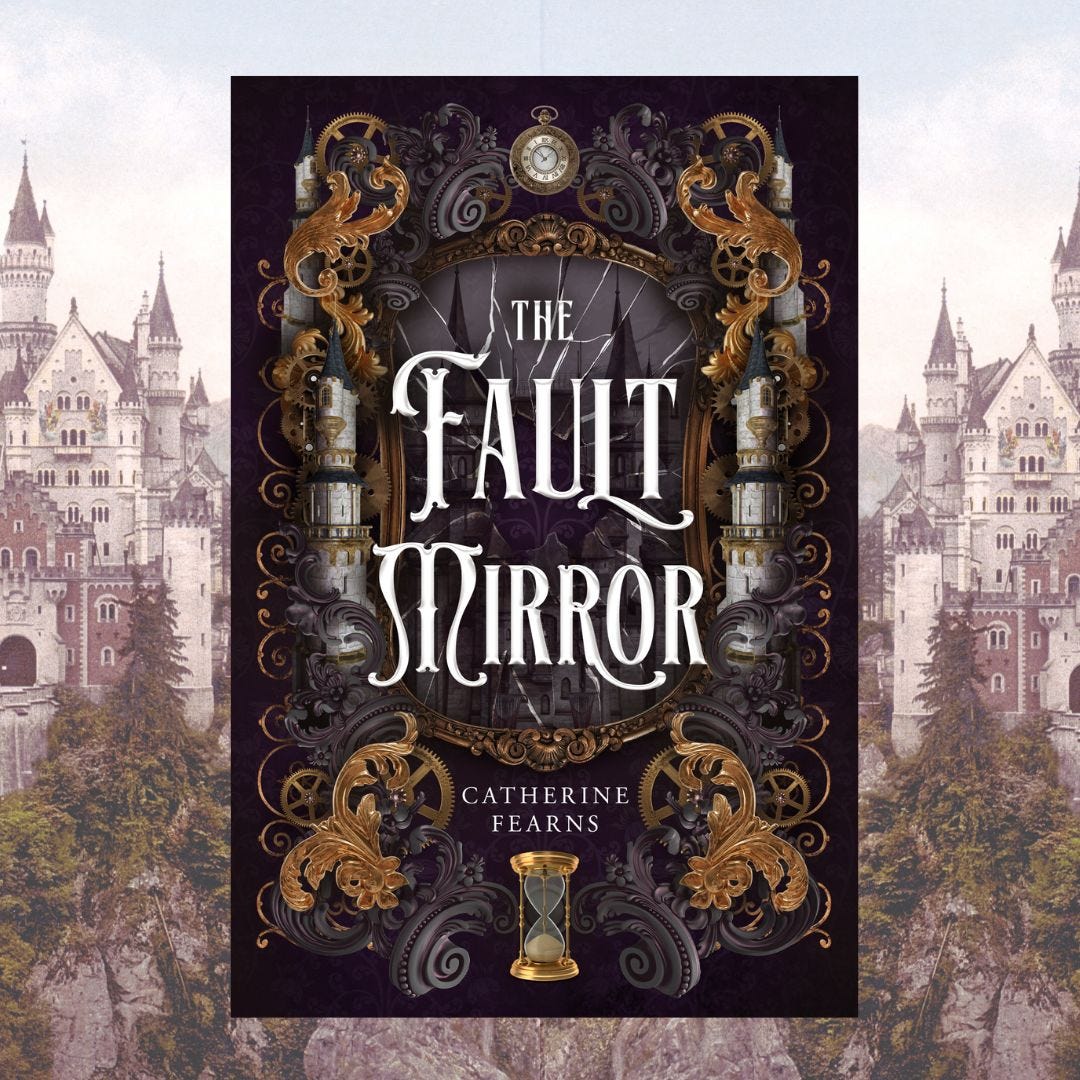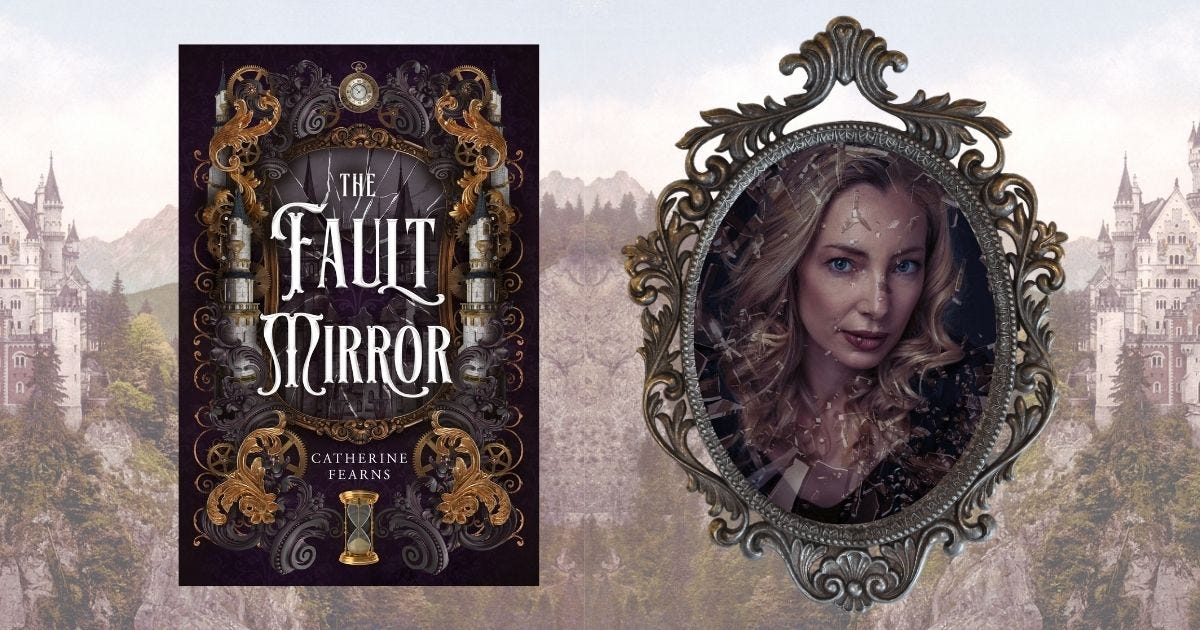Exclusive extract from The Fault Mirror
Here's a sneak preview of an early chapter from my new novel...
Chapter 2: Cyrus, 2035
“So, there you have it. The Problem of the Disappearing House. It wasn’t there, then it was, then it wasn’t.”
Professor Cyrus Field varied his telling of the story each time, embellishing a detail here and there, adding or removing a little piece of dialogue. But he always followed the telling with a dramatic flourish of his black gown as he moved from lectern to window. Once, his movement had been a sudden trademark dart, an impassioned flurry of almost unhinged energy to rouse the students’ minds. Nowadays, it was more of a shuffle.
The seminar room was as much a relic as he was. The top floor of the chapter house, annexed to the college chapel, had been built in the 1500s and changed little in over five hundred years. It was ice cold year-round, and dust gathered in the low vaults where crumbling Protestant whitewash gradually revealed the Catholic frescoes beneath. The only furniture consisted of an old wooden lectern that had once, many centuries before, been a pulpit in the cathedral; two rows of wooden desk-bench structures that students had to slide into awkwardly; and a battered whiteboard on wheels, with its built-in tray of colored marker pens and cloth eraser. The whiteboard was a palimpsest of decades of his scribbles. He kept it partly because he preferred to write things the old-fashioned way, and partly because he knew the students found it quirkily twentieth-century.
The window looked out of the back of the college. He turned away from the students and gazed out across the sea of low morning mist, blanketing the city and pierced by spires. He took a pipe and a silver tobacco box from his tweed pocket and used the window ledge as a table for his ritual, trying to ignore the shake in his hands that was making this process increasingly difficult. Flakes of tobacco spilled onto the windowsill as he tipped and pressed them into his pipe, and he swept them carelessly onto the floor with his fingers. He lit his pipe languidly and looked out across the cloudsea.
He enjoyed the silence of his students deep in thought, as much as he enjoyed the clichéd silhouette that he made, the wistful old professor. He tried to ignore the failing sight that meant he could no longer make out the legions of gargoyles adorning the sandstone spires. Now it was only a general impression of Gothic elegance, with the details filled in by memory. But memory could get you far. Memory was malleable, elastic, molded by desire. If he wanted to embellish the stone figures and grotesques in his mind’s eye, make them into something they were not, where was the harm?
Finally, Cyrus turned to the room in a puff of smoke, with the nihilism that ensured no one had ever complained.
“Thoughts?”
He would vary the way he said this, too, because his tone colored the students’ responses, and wasn’t his life’s work to get as many responses as possible? Today, he opted for earnest, approachable, open to ideas. The room was gradually bathed in a tobacco haze as he awaited the first brave soul. Twenty of the world’s finest young minds taking Introduction to Philosophy, minds sent to him each year to attempt to solve the unsolvable.
A few tentative hands raised. He knew there would be some prepared answers. Professor Field’s Disappearing House Problem was a college legend, and this new crop of young people would have been prepped by the second-year philosophers, just as decades of second-year philosophers had done before them. Last year’s group had come in terrified, a couple of them almost in tears, as they had been pranked with the rumor that Cyrus was a tyrant who would have them sent down from the university if they got the answer wrong.
He pointed to a confident-looking boy. He could gauge the confidence by how the boy leaned back in his chair, twirling a pencil. Body language was everything to Cyrus nowadays, since he could no longer make out people’s features. Encroaching blindness was bringing out his other senses, making him realize how little he had made use of them before. He guessed this boy was from Eton or similar, most likely.
“She has schizophrenia. The house is in her head.”
Never heard that one before.
He scribbled on the whiteboard. The red pen squeaked and ran dry, so he threw it on the floor with the abandon that was part of his act, and picked up a green, inhaling the chemical scent of toxic ink as he removed the lid and poised to write. “Next?”
“He’s gaslighting her,” said someone. “The house is there, but he refuses to see it and convinces her that she is imagining things.”
“Not bad, but since this is a philosophy and not a psychology class, let’s go a bit deeper. Clear your minds of preconceptions. What is it they say in those tech companies and consultancies that most of you will end up in? Blue sky thinking. No wrong answers.” He winced to himself as he said this, a relic statement of his from seminars past. Seminars from times of hope. They all knew that few of these students would be following their dream careers.
“They’re in a movie.”
“A computer game.”
“It’s a drug-induced hallucination.”
“A timeslip into a different dimension.”
“They’re in two different versions of a multiverse.”
“It’s a hologram.”
“Déjà vu—past life regression.”
“She’s been hypnotised.”
“He’s been hypnotised.”
“She made a mistake with the geography. She’s mixing memories, conflating the place with another where she had actually been.”
“It’s entelechy—merely the potential for a house.”
“It’s a thought-form, a manifestation of the subconscious. Everyone dreams of their perfect house, their fairytale castle. And so everyone sees the house they want to see. Perhaps the guy just doesn’t have a dream house.”
“It’s Aristotle—the paradox of place. If the house has a place, then that place must have a place, ad infinitum—therefore it cannot exist.”
“It’s a metaphor for the difference between the male and female brain.”
“It’s a metaphor for the breakdown of a marriage.”
“It’s a metaphor for the decline of religion—they’re on a pilgrimage, and it failed. The holy grail was just a mirage.”
“It’s a made-up problem by a philosophy professor, an abstraction to make us think.”
There was nothing here he hadn’t heard a version of before, but he noted everything on the whiteboard and stored it in his mind. He loved the energy, the opening of minds to possibilities, the whirring of cerebral cogs.
“Okay, let’s take that last comment, and let’s say I made it up. Why? What’s the point of this?” As always, he was able to extend their discussion into a fruitful introduction to ontology. The very nature of being: how do we know that anything exists outside of ourselves? How do we know that we exist? Could we be nothing more than someone else’s thought experiment, or merely one version of infinite possible universes? What does it mean for a house to exist? What do our interpretations of the problem tell us about ourselves?
They talked of Plato, Hume, Heidegger. It was meandering by design, this first session, to inspire them, free their minds of constraints.
Eventually, there was only one student who hadn’t spoken. She had short red hair, not ginger but dyed neon scarlet, shaved on one side, and when Cyrus squinted, he could just about make out the forms of piercings and tattoos. He was about to ask her for a contribution when that annoying Etonian boy raised his hand again and spoke without waiting to be asked.
“Professor, when will you publish the answer?”
“Are you worried I’ll die before I reveal it? I’m not planning to croak this semester, don’t worry.”
I am worried I’ll die before I discover it.
Cyrus hated the question because he didn’t have an answer, either to the question or to the problem, even for himself. There had always been time for everything—time to find the answer, time to publish the answer, time to admit he hadn’t known the answer before. Now, it seemed time was running out for everyone. The latent terror, a slow vulture circling, was the possibility that there was no answer, and never would be.
“There isn’t necessarily an answer. Not every question has an answer. And there are a multitude of truths. Today, one simple question has led us to discuss topics as broad as epistemology, existentialism, Epicurus… Now, who hasn’t spoken yet?” He pointed at the red-haired girl. “What about you…” He was about to say ‘young lady,’ but one could never be too careful, particularly with his failing eyes. “What do you think about the question?”
She shifted in her chair, and there was a confident pause. “Is it a real-life example?”
Around the room, there were a few draws of breath and a few titters.
“A real-life disappearing house. Love it,” laughed the Eton boy.
But there was no trace of sarcasm in the girl’s voice. Cyrus folded his arms and put his head to one side, considering. “Why does it matter?”
“I think it matters a lot.” She spoke with an international accent he couldn’t quite pinpoint, in a voice that faltered but intrigued him with its quiet intelligence. There was a slight defiance to it.
“If this is an abstraction,” she continued, nodding slowly to herself as she articulated her thoughts, “then our answers can be philosophical, fantastical. We can explore the realms of impossibility. But if it’s a real-life situation, then we must ground our answers in science. In physics, or geology, or psychology. There has to be an explanation.”
“Does there? I don’t necessarily agree,” he said with kindness. “Real life does not preclude the philosophical, the fantastical. If this were a real-life situation, it would not preclude any possibility. Because nothing is stranger than real life. What are some of the mysteries of life?” He addressed the whole class now. It was a ridiculous question, but he was tired, and he wanted to see where it took them. There were mentions of dark matter, God, the Big Bang, the possibility of alien life. “Lots of cosmological suggestions, indeed. But before we even get to science—what else?”
“Love,” three people said at once.
“Love, indeed. The mysteries of love. Love can make strange things happen. Love can make anything possible.”
“Nothing is possible without love… for love puts one in the mood to risk everything.” It came like a ghost, a voice from another dimension, this quiet but insistent voice from the red-haired girl.
“Carl Jung,” they both said at the same time.
Something happened, some slight shift in the universe. He suddenly wanted to know everything about this girl, and at the same time, he wanted to get away from her as quickly as possible and never see her again.








Loving it. Very atmospheric and will be a great Autumnal read I think. Looking forward to this.